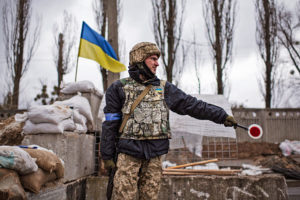“In the grand scheme of things, this isn’t about Putin’s attack against Ukraine… It is about democracy, sovereignty — fundamentals like freedom of speech and human rights. It is about Western democracies’ ability to stand up for themselves and the values they’re built on.”
This may sound like the words of a liberal internationalist. But they come from Jimmie Åkesson, leader of the anti-immigration, Right-wing populist party, the Sweden Democrats. In the past he has equivocated when asked whether he preferred Putin to Emmanuel Macron or Joe Biden. But four days after the onset of Russia’s invasion, speaking to Sweden’s parliament, his tone was unflinching.
Many Right-wing leaders have shifted their rhetoric since the start of the war. Marine Le Pen first downplayed Russia’s threat to Europe and described Putin as a force for good, only to then call Russia’s invasion “condemnable”. In Italy, Lega Party leader, Matteo Salvini, supported Russia’s annexation of Crimea, opposed retaliatory EU sanctions, and praised Russia’s government for “working for its people’s interests”. But he eventually condemned Putin and “Russian aggression”.
The shifts in rhetoric offer insight into their values, as well as the challenges facing their loudest opponents. Indeed, as the far-Right distances itself from Putin in varying degrees of about-face, centrist commentators are pouncing. The Times of Israel claimed Russia’s invasion “plunged far-Right movements across Europe into an identity crisis, as they struggle to square their loyalty to Vladimir Putin with the public’s overwhelming solidarity with Kyiv”, leaving the far-Right in a “pickle”. The Japan Times and the Times of India ran the same report calling it a “quagmire”, while the New York Times said Europe’s nationalists were “squirming”.
Commentators such as prominent Russian-American journalist Julia Ioffe were more prescriptive than descriptive in their characterisations. As she wrote for an American audience: “To the people who think… that trans people are made up, that ‘cancel culture’ has gone too far, that ‘men should be men and women should women’ — congratulations, you agree with Putin. You are his ideological ally.” CNN columnist Frida Ghitis went further in theorising coherence and consistency between Russia’s invasion and the agendas of Western rightists, linking Putin with Marine Le Pen’s reach for the French presidency and even Elon Musk’s attempt to purchase and transform Twitter. “We’re all witnessing the great challenge of our times play out around us,” she concludes.
Two agendas seem to drive much of this commentary. The first, revealed in comments such as Ioffe’s, is strategic opportunism: to use public opinion about foreign policy to advance a domestic political effort. Link local cultural conservatives to the unpopular Putin via alleged ideological commonalities, and you make conservatism less appealing.
The second is more psychological. It has to do with convincing yourself that the people you oppose in one context are also your enemies in all others: to declare the universality of your ideological map, and to extinguish all suspicion that You and They might look at a single consequential political development and feel the same way about it. It may be an outgrowth of the Left’s enduring insistence that its visions and campaigns (minority rights, environmentalism, anti-Imperialism, etc.) will all smoothly integrate in a political universe suited to mass management, where ideological consistency and coherence reign.
Ideological consistency is elusive among the far-Right — a fact the Left likes to point out, without understanding its implications. But it’s worth understanding the nuances of the far-Right’s worldviews and values, which vary and are at times mutually irreconcilable. If we were to divide Europe’s ultra-nationalists into two camps, we would see, on the one side, more moderate reformers who tend to endorse cultural nationalism, philosemitism, and pro-democratic liberal chauvinism opposite hardline idealists lurching toward ethnonationalism, anti-Semitism, cultural conservatism, explicit anti-liberalism, and authoritarianism.
However, perhaps counterintuitively, “liberal” nationalists have produced some of the more tepid criticisms of Russia’s invasion. One example is that blond bombast Geert Wilders of the Dutch Party for Freedom, who has long claimed that liberalism, rather than conservatism, motivates his opposition to immigration on the grounds that Muslims threaten feminism, gay rights, and democracy. And yet that ostensible commitment to core liberal values has seldom inspired opposition toward anti-liberal Putin. Even in the weeks following the invasion, Wilders’s previously qualified endorsement of the Russian leader has mostly gone quiet as he opposes sanctions and spreads talking points of the Russian state in his media channels.
On the other hand, there is no shortage of far-Right parties in Eastern Europe who embrace ultraconservatism while opposing Putin. The Alliance for the Union of Romanians and Latvia’s National Alliance, which have both always been hyper-conservative and anti-Russian — this has accelerated since February 24, with the National Alliance, for instance, proposing to deny residency to Russian citizens in Latvia. Meanwhile, the Conservative People’s Party of Estonia — once mildly supportive of Putin — not only switched its tone but has been supporting proposed energy embargoes. And the European country with one of the most robust records of action in support for Ukraine, its neighbour Poland, is led by Andrzej Duda, an ultraconservative sprung from the Law and Justice party, who pursued dramatic curtailing of abortions, gay rights, and immigration.
Political sympathy toward Russia, in other words, is not tracking with far-Right parties’ attitudes toward liberalism. Their reactions, instead, appear plainly related to whether they feel directly threatened by Russian military expansion. When facing an existential crisis (Poland), or seeing historic antagonisms revived (Sweden, Finland), they care little for talk of ideology.
So while centrists see strategic and idealistic reasons to criticise the far-Right now, their attacks may be short-sighted. With Western economic and military coalitions being tested — and with calls from some on the Left for Ukraine to surrender, uttered with an aloofness resembling liturgy more than political analysis — far-Right parties may provide vital reinforcement. This is true even beyond Baltic states and Poland. In Sweden, for instance, the Sweden Democrats not only voted in favour of sending arms to Ukraine, but also altered their stance on Nato membership early in response to Russia’s invasion, bolstering the cause and with it the likelihood that Russia ends this conflict geopolitically weakened. Matteo Salvini, meanwhile, pledged early support for Ukrainian refugees — a move that observers speculated might have been a tactic to outflank a political threat from the Right ahead of elections next year, from the ascendent Brothers of Italy party, who are vocally pro-Ukraine.
But a deeper challenge beckons, that of resigning ourselves to the possibility that certain circumstances might align us with our political opposites. Grievances often levied against the far-Right in the West — about its anti-democratic sentiment; disinformation; a coarsened political discourse; fetishes for state violence — take a different shape today. Confrontation with Russia calls us to question whether the internal fights we have in Western politics really do span the ideological spectrum as we like to think, or whether we curse each other while huddled in the corner of a vaster terrain. When presented with actual violence instead of symbolic violence, and war crimes instead of word crimes, we may find we have less time for things like ideology.
Disclaimer
Some of the posts we share are controversial and we do not necessarily agree with them in the whole extend. Sometimes we agree with the content or part of it but we do not agree with the narration or language. Nevertheless we find them somehow interesting, valuable and/or informative or we share them, because we strongly believe in freedom of speech, free press and journalism. We strongly encourage you to have a critical approach to all the content, do your own research and analysis to build your own opinion.
We would be glad to have your feedback.
Source: UnHerd Read the original article here: https://unherd.com




